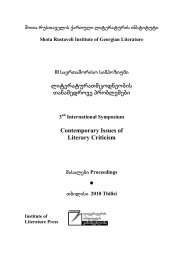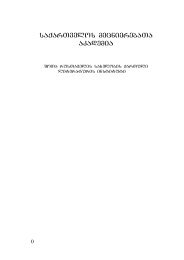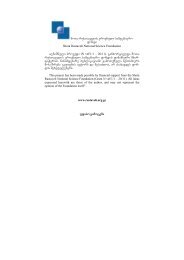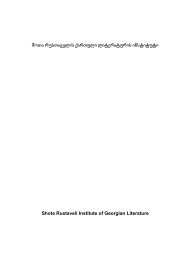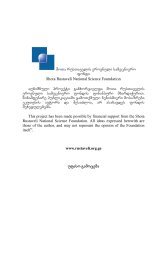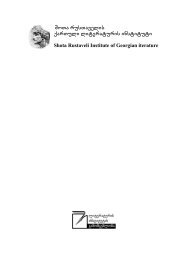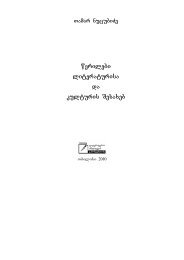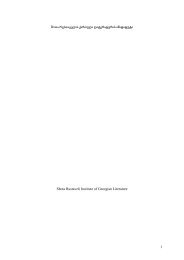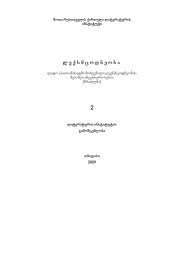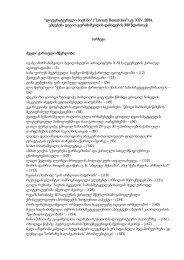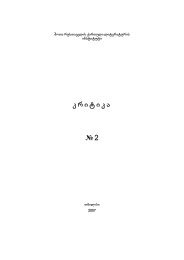Shota Rustaveli Institute of Georgian Literature
Shota Rustaveli Institute of Georgian Literature
Shota Rustaveli Institute of Georgian Literature
Create successful ePaper yourself
Turn your PDF publications into a flip-book with our unique Google optimized e-Paper software.
and the ditto old-Arabian epic „Amrilkais“ (1841/1843) were published in Rückert’s lifetime, but they did not find a<br />
ready market. And almost all the rest <strong>of</strong> Rückert’s translations produced during this second period – the „Quran“<br />
included – e. g. „Djami’s Love Songs (1831/1844-1848)“, „Saadi’s Divan“ (1845/ published 1893), „Saadi’s political<br />
Poems“ (1845/ published 1894), „Saadi’s Bostan“ (1851/ published 1882), the Indian epic „Sakuntala“ (1855/<br />
published 1867) or Hafis Quatrains (1846-1862/1877) remained a long time unpublished.<br />
5. Conclusion<br />
It seems, that Rückert could play his self chosen role as a mediator between different cultures as long as he<br />
gave priority to his poetical capacities, because this talent seems to have been the link between <strong>of</strong>fered foreign<br />
literature and accustomed lyric food. As long as the known poet Rückert shone through the literary texture <strong>of</strong> exotic<br />
oriental poems, foreign form and content did not become too strange for readership.<br />
In his second phase as „poetical scholar“ Rückert translated in fact more adequate to the oriental originals, but<br />
by following this path <strong>of</strong> academic life and work he began to „alienate“ his auditory increasingly. But these changes,<br />
corresponded with his own increasing doubts in the chosen role as mediator, as we can read in his poems <strong>of</strong> the<br />
1830ies, where he is very well aware <strong>of</strong> the difficulties <strong>of</strong> intercultural exchange between Orient and Occident.<br />
Nevertheless Rückert should continue in his oriental studies obliviously until the end <strong>of</strong> his life.<br />
<strong>Literature</strong>:<br />
Bobzin 2000: Bobzin Hartmut [editor]: Der Koran in der Übersetzung von Friedrich Rückert […], Mit erklärenden Anmerkungen<br />
von Wolfdietrich Fischer. Würzburg:Ergon 3 2000.<br />
Erdmann 1988: Erdmann Jürgen [editor]: 200 Jahre Friedrich Rückert 1788-1866 Dichter und Gelehrter. Coburg: Landesbibliothek,<br />
1988.<br />
Kötting Dagmar: „Dahinter schlief vom Orient mein Strahl“. „Der Scheintod“ eine erste poetische Beschäftigung Friedrich<br />
Rückerts mit dem Orient. Rückert-Studien VII. Würzburg: Ergon, 1993.<br />
Prang 1963: Prang Helmut: Friedrich Rückert. Geist und Form der Sprache. Schweinfurt: Stadt, 1963<br />
Rückert 1837: Rückert Friedrich: Gesammelte Gedichte. Erlangen: Heyder, 1837.<br />
Rückert 1844: Rückert Friedrich: Liebesfrühling. Frankfurt/Main: Sauerländer, 1844.<br />
Schimmel 1987: Schimmel Annemarie: Friedrich Rückert. Lebensbild und Einführung in sein Werk. Freiburg/Brsg: Herder, 1987.<br />
Wendt 1830: Wendt, Amadeus [editor]: Musenalmanach für das Jahr 1831. Zweiter Jahrgang, Mit Tiecks Bildniß. Leipzig:<br />
Weidmann, [1830].<br />
Wiener 1994: Wiener Claudia: Friedrich Rückerts „De idea philologiae“ als dichtungstheoretische Schrift und Lebensprogramm.<br />
Schweinfurt: Stadtarchiv, 1994.<br />
10



